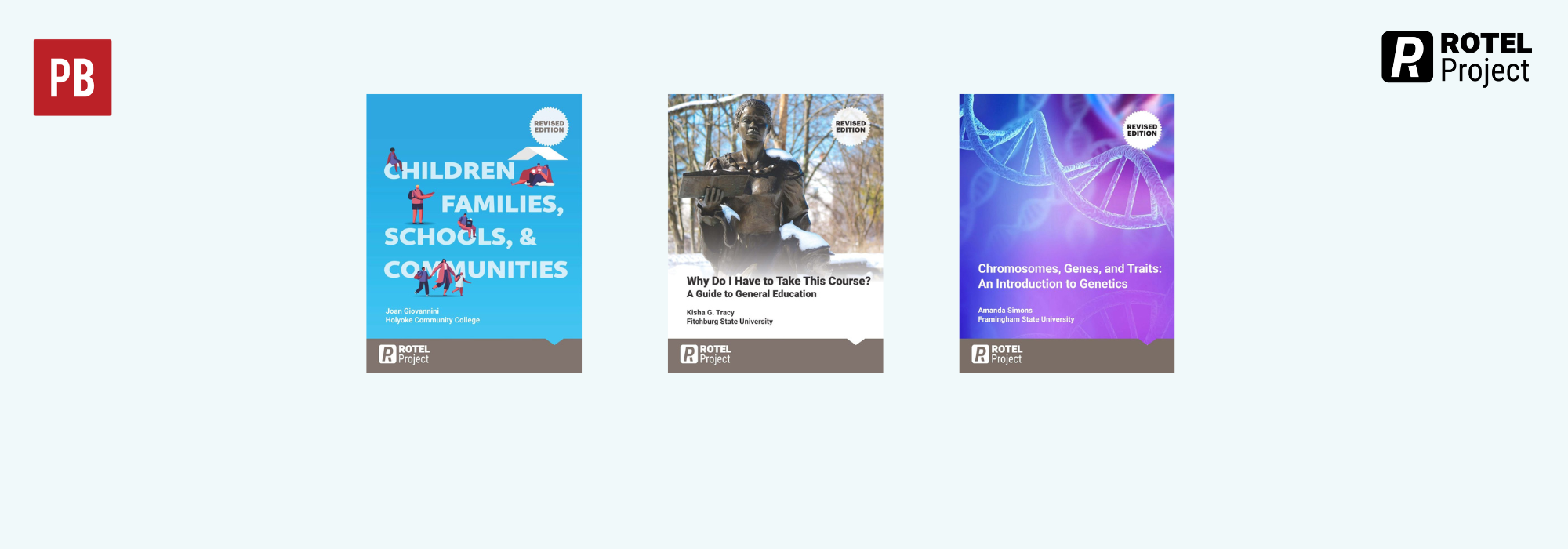Adaptation in Action: Voices from the ROTEL Project
Over the past three years, the ROTEL (Remixing Open Textbooks through an Equity Lens) project has supported faculty across Massachusetts as they reimagined course materials to better serve their students. Through professional development, peer support, and a strong equity focus, ROTEL helped over 70 educators adapt and remix open educational resources (OER) — and publish 27 new textbooks along the way.

At the heart of this effort was the Open Publishing Project Certificate (OPC) (formerly known as the Textbook Success Program). Designed and delivered by the Rebus Foundation, this year-long program offered instruction, facilitation, and space for reflection — not just about how to build OER, but why.
Below, we hear from three faculty members, Joan Giovannini, Mandy Simons, and Kisha Tracy, whose projects exemplify the care, intentionality, and collaborative spirit that defined the ROTEL Project.
Joan Giovannini: Expanding Family, Centering Students
Joan, an early childhood education instructor at Holyoke Community College (now also at the University of Massachusetts), adapted Children, Families, Schools, and Communities to reflect broader, more inclusive understandings of family.
“One of the primary drivers was looking at the word family — and how it’s used in the textbook, how it’s portrayed in the textbook — and really wanting to widen that scope and diversify that understanding.”
Joan expanded the definition of “family” in her textbook to include non-traditional, multi-generational, and chosen family structures, helping more students see themselves reflected in the material. She incorporated diverse case studies, quotes, and stories, especially from marginalized communities, to create a richer, more inclusive resource.
Many of Joan’s students are already working in the field of early childhood education, and she wanted the textbook to honor their lived experiences. Through open pedagogy, she invited them into the process—resulting in a second edition that includes co-created case studies and rewritten chapters.
Mandy Simons: Making Genetics Accessible and Responsible
Mandy, a biology professor and department chair at Framingham State University, saw the pandemic’s impact firsthand: students scattered across locations, unable to access costly textbooks.
“As a STEM educator, I’m really cognizant of textbook costs, where textbooks can be hundreds of dollars for a book that if they wanted to purchase it, they’re only going to use maybe one or two semesters.”
Her solution: build a genetics textbook that was free, accessible, and deeply thoughtful about the ethical context of the field. (Read her text Chromosomes, Genes, and Traits: An Introduction to Genetics here)
“Genetics has a long history of being used as justification where it really shouldn’t be. And I wanted to use a resource that treated those topics with respect.”
Because no existing resource met all her needs, Mandy took an adaptive-creative approach — remixing materials from multiple OER texts and pulling in images and diagrams from open-access scientific journals. She also developed original graphics, often in collaboration with colleagues.
“Images played a huge role… developing them from scratch is challenging. Open access journals were a really powerful source — for diagrams, data, and context.”
Kisha Tracy: Reframing General Education in the Context of “Good Trouble”
At Fitchburg State University, Kisha took on a unique challenge: helping students understand why general education matters. Her book, Why Do I Have to Take This Course?, isn’t your typical textbook. It’s a guide that uses the late John Lewis’ concept of “good trouble” as a framing device, connecting general ed outcomes to civic responsibility, critical thinking, and social justice.
“Following the 2021 redesign of our general education program, we recognized the need to more effectively communicate its value to students, prompting the creation of resources that highlight its relevance to their academic and personal growth.”
The book is organized by learning outcome (e.g., information literacy, diverse perspectives, quantitative reasoning), and each section includes expert voices from across disciplines. Kisha curated statements from colleagues and adapted relevant OER to cover areas outside her expertise. This community-driven approach ensured her textbook aligned with the necessary outcomes while still reflecting her own teaching values.
More than Just a Checklist
Behind each of these projects was not only deep pedagogical thinking, but also a sense of community. OPC participants learned together, met one-on-one with facilitators, and joined reflection panels and celebrations. The aim wasn’t just to produce books — it was to build a supportive culture around OER creation.
For ROTEL and OPC participants, adaptation wasn’t just a technical task, it was a chance to align course materials with values, deepen student engagement, and challenge dominant narratives.
👉 Watch the full webinar recording “Exploring the Power of Adaptation in Open Education”
👉 See the full catalog of books published by the ROTEL Project
